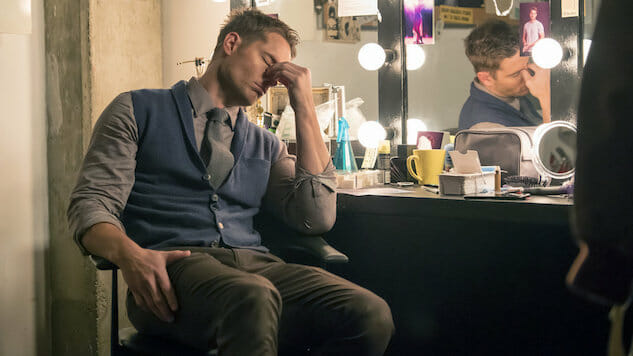This Is Us: “Jack Pearson’s Son”
(Episode 1.15)
Ron Batzdorff/NBC
Sometimes our personal truths can be the hardest thing to share with the people closest to us—be it our partners, our siblings or our children. This is not just down to the reluctance to air our vulnerabilities, but our ego’s determination not to mess with the positive perceptions others may have of us, especially our children. Kids tend to see their parents as heroes: strong, invincible beings who can take on the whole world without ever buckling under its weight. When we show anything other than our superhero qualities, we feel as though we’ve failed our children simply by being human. The pressure we put on ourselves to live up to these expectations can be crippling, so we opt for the only other way we know to keep up this charade: We lie to ourselves and those around us. “Jack Pearson’s Son” explores these truths beautifully.
The first few episodes of This Is Us hinted at Jack struggling under the stresses of being a working family man. And although we’ve had glimpses of Jack blowing off steam with little regard to Rebecca, it’s been impossible to see him as anything other than a sensitive, caring, kind and loving husband and father. So far, he has always acted as the voice of reason when Rebecca felt overwhelmed; he’s sacrificed everything to keep his family afloat and has always been there for his children, through the good, the bad and the ugly. He’s never given us a reason to believe he doubted his decisions or his actions. His way of navigating through life and parenthood has always seemed intuitive. In “Jack Pearson’s Son” however, we learn that, just like everyone else, Jack finds it difficult to be the good guy all the time.
His teenage kids are starting to lead their own lives, and so is Rebecca. As much as he believes Rebecca deserves to go on tour with her band and have an adventure of her own, he can’t help but feel as though their life and their family are no longer enough for her. Add to that a bitter pinch of jealousy over the fact that Rebecca failed to mention one of her fellow band members is an ex from the distant past, and Jack can no longer hide his true feelings about her impending tour. Instead of talking it out and finding a solution together, though, Jack takes off on his own to go drinking—and if earlier episodes are anything to go by, this will become Jack’s go-to coping mechanism.
-

-

-

-

-

-

-

-

-

-

-

-

-

-

-

-

-

-

-

-

-

-

-

-

-

-

-

-

-

-

-

-

-

-

-

-

-

-

-

-








































